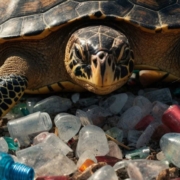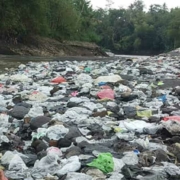28 november 2023
As all 2,000 participants headed home after the third meeting of the United Nations Intergovernmental Negotiating Committee (UNEP) on Plastic Pollution (INC-3), disappointment reigned. Initially, progress seemed to have been made, but it was overshadowed by failed negotiations on the final day. The ultimate goal of the convention – ending plastic pollution – did not come any closer during the session held from 13 to 19 November in Nairobi, Kenya.
Differences of opinion flared up over how much, and even if, plastic production should be reduced, an idea that did figure prominently in the zero draft of the treaty published by the UN last September.
Indeed, plastic-producing (oil) countries and industries claim that production has nothing to do with pollution. “That is an illogical argument, because if you produce more plastic, you have more plastic waste,” says our director Maria Westerbos, who was there in Kenya.
INTERNATIONAL TREATY ON PLASTIC POLLUTION ENCOUNTERS BUMPS, BUT KEEPS MOVING FORWARD
“It was a small step forward and a missed opportunity to make real progress on the supposed timeline,” says Maria Westerbos. “Still, I don’t see it bleak. That’s how meetings go when the stakes are high.”
The Plastic Health Council, a collaboration of Plastic Soup Foundation and Plastic Planet, organised a well-attended side event focusing on the effects of plastic and the chemical additives in it. We published an open letter in The Daily Telegraph signed by 20 prominent scientists from around the world. In it, they called for this “once in a lifetime opportunity” to ensure that the agreement is strong enough to protect the health of future generations.
Dr Pete Myers, chief scientist at Environmental Health Sciences and member of the Plastic Health Council, said, “What started as an almost invisible trickle at the beginning of the 20th century has now grown into a monstrous tsunami in the 21st. Plastic and plastic chemicals have spread like a plague to every part of our planet, even into our bodies with levels known to be dangerous. Yet industry projections based on ‘business as usual’ expect the amount of plastic being made to double by the middle of this century. “
INC-3 was the third of five meetings organised to create an international, legally binding treaty to stop the world’s plastic pollution. The next meeting (INC-4) is scheduled for April 2024 in Ottawa, Ontario.
Negotiators plan to reach consensus by the end of 2024 at INC-5, which will take place next November in Seoul, South Korea.
YOU MIGHT ALSO BE INTERESTED IN:
Plastic health council as compass for un plastics treaty
It’s raining plastic
Plastic found in the human heart










